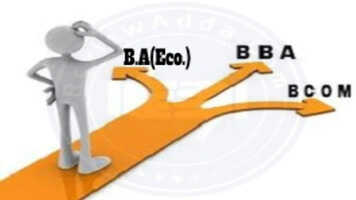Comparing BBA, B.Com, and BA Economics: Building a Stronger Foundation for Management Careers
Examines the differences between management careers offered by BBA, B.Com, and BA Economics.Picking the right subject at college really matters, more so when your goal's in running businesses. Common picks include BBA, known as Bachelor of Business Administration, alongside B.Com or Bachelor of Commerce, also BA in Economics. Though each builds useful abilities, they take quite different paths teaching business know-how. This short breakdown shows how they stack up, guiding you toward the best launchpad for leading teams later on.
1. BBA (Bachelor of Business Administration)
The BBA opens doors fast when chasing top jobs in business. Since it’s made to offer practical skills along with a clear understanding of how businesses run, people get stuck into actual tactics. As you begin viewing stuff the way a startup might, fresh angles show up. Marketing mixes with HR, and financial concerns relate to how teams actually operate.
Why choose BBA?
BBA zeroes in on actual job skills instead of just theory - lots of courses include work placements or live company tasks, so learners build know-how during their studies. Thanks to this learn-by-doing method along with classes covering team leadership and smart planning choices, the degree fits people already set on climbing the corporate ladder. Plus it sets you up well for an MBA later, something that often leads to top-level jobs at big firms.
2. B.Com (Bachelor of Commerce)
The B.Com zeroes in on topics tied to commerce - think accounting, finance, or economics. While it gives a fair idea about how companies work, the focus zeroes in more on cash issues and trade rules than leading folks or running groups.
Why choose B.Com?
B.Com fits right if you’re drawn to roles dealing with figures, balancing accounts, handling taxes, or reviewing business records. This path dives deep into tracking cash flow, knowing legal stuff tied to businesses, plus dealing with big-firm budgets. Still, unlike a BBA, it doesn’t focus much on running groups or planning long-term moves in companies.
If you enjoy working with figures while aiming to focus on money matters or bookkeeping, B.Com gives a focused path centered around financial topics. Besides that, it sets up a solid base if you’re planning to go after credentials such as CA or CFA down the line.
3. BA in Economics
The BA in Economics lets you understand how economies work, exploring ideas about small-scale and big-picture shifts, while working with numbers. This course strengthens your reasoning and skill for solving complex problems, setting you up for making solid decisions down the road.
Why choose BA Economics?
A bachelor’s degree in Economics usually doesn’t cover leading groups or handling operations. But it does instill a higher level of thinking by illustrating how financial flows drive business decisions. It works if your desire is to set regulations, track market activities, or present financial advice. Ideal for anyone whose interest is data analysis and pinpointing trends within consumer spending, but it lacks that hands-on management capability that comes with a BBA, as true understanding often only comes through experience.
Which is the Best for Management?
If you’re aiming for leadership jobs, go for the BBA, it’s likely the top choice. This path mixes classroom learning with real-world abilities, focusing heavily on guiding teams, handling group dynamics, or making big-picture calls. Choose B.Com when numbers and money stuff are more your thing. Go with BA Economics if you like digging into how economies work, even if you haven’t managed businesses much before.
So it really comes down to what kind of job you want later on. When leading a team matters most, going for a BBA just makes sense.
Latest Articles

Comparing BBA, B.Com, and BA Economics: Building a Stronger Foundation for Management Careers
UniList Desk
Nov 07 2025
Top Management Courses After Class 12 Without Maths
UniList Desk
Nov 07 2025
The Role of Quantum Computing in Modern Science: What Students Must Know
UniList Desk
Nov 07 2025
How to Become a Data Analyst: A Step-by-Step Guide for Indian Students
UniList Desk
Nov 07 2025
List of M.Tech Colleges Without GATE in India
UniList Desk
Nov 06 2025
Private Medical Colleges vs Government Institutions: Admission, Fees, and Outcomes
UniList Desk
Nov 05 2025
Future Physicians Training in Telemedicine and Remote Labs
UniList Desk
Nov 05 2025
The Future of the Hospitality Industry in the Digital Era
UniList Desk
Nov 05 2025
How to Crack UPSC Without Quitting Your Job
UniList Desk
Nov 05 2025
The Prospects of Educational Simulations and Digital Labs
UniList Desk
Nov 04 2025
Learn More, Grow Faster
Get Updates Straight to Your Inbox!